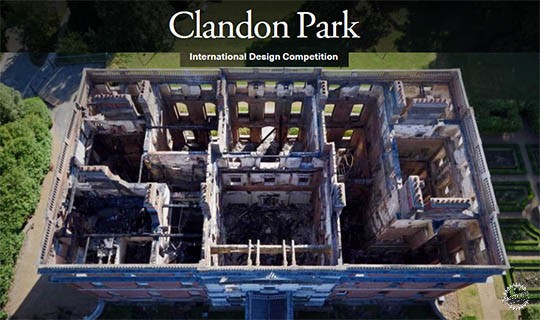
Clandon Park International Design Competition
由专筑网缕夕,刘庆新编译
提交时间:2017年4月21日
注册时间:2017年4月21日
语言:英语
位置:英国克兰公园
奖品:请参阅下面的详细信息
类型:开放型
通过克兰公园国际设计大赛,国家信托基金正在寻找一个世界级具多学科的设计团队,来重新设计克兰公园,这是信托的一级列表中18世纪的帕拉第奥房子,在吉尔福德附近英格兰东南部, 两年前遭受重大火灾。
该信托设想对底层的一些主要房间进行感性和有深度的重建,同时引入新的画廊空间,用于富有想象力的节目制作和扩大上层的游客设施。
信托基金正在寻找一个由建筑师领导的团队,并在设计,保护,结构工程,机电工程,室内和景观设计方面展示专业知识。 鼓励创意合作,并挖掘潜能。
参与报名方式:参赛人员将需要在比赛网站上填写在线表格,并上传文档,详细说明他们的项目理解,团队信息和相关经验。 在比赛的第一阶段不需要设计。
这是一个两阶段的竞争。 第一阶段是根据相关技能,过去经验和对项目简介的理解,对多学科设计团队进行国际性检索。 它将最终选出五个或更多队的入围名单。
比赛的目标是寻找一个团队,将创造一个非常美丽而又和谐的设计,集成了有重要历史价值的房间敏感修复和剩余的历史织物与上层新的灵活空间,提供给具有创造力的节目使用; 整个设计显示出对光,空间,功能和材料的操纵的特殊理解,以及重新发现房子与其设置的关系。
对于第二阶段的入围竞争对手,竞赛简介有几个方面:
• 恢复受损的历史室内设施,包括主要的房间。
• 创造灵活的空间,可容纳永久,半永久性和临时展览 —— 设计符合国际标准。
• 新的访客,教育和社会设施。
• 重新思考房子的景观/环境的机会。
这个设计具有复杂的挑战性。虽然项目愿景上概述了在上层地面修复采用新的干预措施,但是设计不应该纯粹以平面式的方式构思。 设计师将是如何解决垂直循环空间的一个关键决定,并将它带给现代人们使用。 国家信托的意图是,未来的克兰公园会回首但目光处于未来,不受其火灾的历史,意义和地方精神的约束。
在一楼待恢复的空间包括的主要房间:大理石大厅,沙龙,图书馆,演讲厅和卧室。
一楼和二楼的新功能包括:二楼咖啡厅,一楼展厅/画廊空间,社区教育/车间/会议空间,工作人员和志愿者设施和访客设施。 这些新的画廊和访客空间将需要灵活和现代的功能,同时还要前景工艺和细节,并结合“发现”原有要素(视情况而定)。 这些空间对于开发克兰公园新用途和为房子带来新生活是至关重要的。
几个世纪以来,这里发生了巨大的变化,公园内的湖泊的景观已经失去了,原来前往房子的道路也改变了。 无论是出于对房子的原始建筑师帕拉第奥设计的欣赏,还是游客对艺术品和农村的看法,都意味着更新重建对房子有巨大的益处。
在比赛的第二阶段,将向入围的队伍提供详细的设计概要。
比赛评审委员会将由国家信托委员会成员Sandy Nairne担任主席,并且是国家肖像画廊的前任主任。 全体陪审团将在比赛的第二阶段公布。
入围名单将于5月底公布。 在夏末,概念设计将以数字方式显示,并在克兰公园的公开展览会上展示,给公众和利益相关者一个反馈机会。 随后,比赛评审团将会见面试团队,审查设计和选择获奖团队。 获胜队伍预计将于2017年秋季宣布。
Submission: April 21, 2017
Registration: April 21, 2017
Language: English
Location: Clandon Park, UK
Prizes: Please see details below
Type: Open
Through the Clandon Park International Design Competition, the National Trust is searching for a world-class multidisciplinary design team to restore and reimagine Clandon Park, the Trust’s Grade I listed, 18th-century Palladian house, near Guildford in the south-east of England, which suffered a major fire two years ago.
The Trust envisages a sensitive and thoughtful restoration of some of the principal state rooms on the ground floor along with the introduction of new gallery spaces for imaginative programming and expanded visitor facilities on the upper levels.
The Trust is looking for a team led by an architect and demonstrating expertise in design, conservation, structural engineering, mechanical and electrical engineering, interpretation and landscape design. Creative collaborations are encouraged and additional skills may be proposed.
To enter, competitors will need to fill out the online form on the competition website and upload documents detailing their project understanding, proposed team and relevant experience. No design is sought at the first stage of the competition.
This is a two-stage competition. The first stage is an international search for a multidisciplinary design team, based on relevant skills, past experience and an understanding of the project brief. It will culminate in the selection of a shortlist of five or more teams.
The competition’s objective is to find a team who will create an outstandingly beautiful and harmonious design that integrates a sensitive restoration of the historically-significant rooms and remaining historic fabric with new flexible spaces on the upper floors for imaginative programming and events; the whole design showing an exceptional understanding of the manipulation of light, space, function and material as well as rediscovering the house’s relationship with its setting.
For shortlisted competitors at stage two, the competition brief has several aspects:
• Restoration of the damaged historic interiors including the principal state rooms.
• Creation of flexible spaces that can house permanent, semi-permanent and touring exhibitions – designed to international standards.
• New visitor, education and social facilities.
• An opportunity to rethink the landscaping/setting of the house.
The design challenge at Clandon is complex. While the project vision outlines a ground floor restoration with new interventions at the upper levels, the design should not be conceived purely in terms of a sandwich of layers. A key decision for designers will be how the vertical circulation is resolved and presented to contemporary users. The National Trust’s intention is that the Clandon Park of the future will respond to, but not be constrained by, its pre-fire history, significance and spirit of place.
The spaces to be restored on the ground floor include the principal state rooms: the Marble Hall, Saloon, Library, Speakers’ Parlour, and State Bedroom.
The new interventions on the first and second floors are to include: a second floor café, first floor exhibition/gallery spaces, community education/workshop/meeting spaces, staff and volunteer facilities and visitor facilities. These new gallery and visitor spaces will need to be flexible and contemporary in function, while also foregrounding craft and detail and incorporating ‘found’ heritage elements (as appropriate). These spaces will be essential in developing new uses for Clandon and bringing new life to the house.
Over the centuries, the views both from and to the house have been compromised, views to the lake within the park have been lost, and the original approach to the house has been changed. Both an appreciation of the importance of setting to the house’s original Palladian design and the appetite for audiences to look at both artefacts and the countryside, mean an improved setting will hugely benefit the house.
A detailed design brief will be provided to shortlisted teams at the second stage of the competition.
The competition jury will be chaired by Sandy Nairne CBE FSA, National Trust Board of Trustees member, and former director of the National Portrait Gallery. The full jury will be announced at the competition’s second stage.
The shortlist will be announced towards the end of May. In late summer the concept designs will be displayed digitally and in a public exhibition at Clandon with opportunities for public and stakeholder feedback. Subsequently, the competition jury will meet to interview the teams, review the designs and select a winner. The winning team is expected to be announced in early autumn 2017.
出处:本文译自competitions.archi/,转载请注明出处。
|
|
